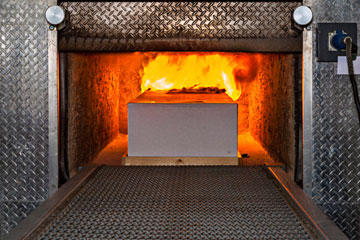
A body in the fire-based crematory oven of Lakewood Cemetery.
(8 of 8)
Over the past five years, revenue growth across the industry has declined largely because low-cost cremations have pushed more-expensive burials aside. There's no sign that that will wane, meaning funeral directors will have to find new ways of making up for the loss. Demand may push the cost of cremations higher, but it's likely that funeral directors will seek to make up deficits by selling more merchandise and pushing elaborate services.
For those who choose cremation, according to CANA, roughly a third of the cremains are buried in traditional cemeteries, a third are taken home by relatives and a third are scattered. That last third is what the industry is targeting with its endless array of products.
"Scattering destroys the need for a memorial," says Engler. "It destroys cremationists' purpose. The idea was that they had to create a memorial so that it would be a permanent place to remember the dead, but it also perpetuates their business."
The industry has historically been criticized for taking advantage of families and selling them unnecessary products at a time of grief. A 2007 AARP poll showed that many Americans seemed unaware that embalming and coffin-encasing burial vaults, both of which are often purchased, are either never or rarely required by law. But many cemeteries require vaults, which average about $1,200. Depending on which funeral homes are analyzed, profit margins across the industry are estimated to be as high as 13%, according to market-research analyst IBIS World--often due to high markup on merchandise like caskets. Others estimate the industry's profit margins at closer to 5% or 6%, which is the figure supported by NFDA.
Either way, death is a business. Memorials are important for funeral directors because they can't make a living on ashes alone. But it's important for you too, because whether you realize it or not, you may be setting fire to your own history, at least if you decide against having your ashes memorialized somewhere that could be easily visited by your descendants. And what Americans of the future will think of their ancestors' collectively going up in flames won't be known for decades.
Even though he now performs more cremations, Musgrove still owns an old cemetery. When he talks about his cremation business, it's straightforward, by the book. But as he starts to describe his cemetery, Musgrove's voice wavers and gets quiet, and he becomes contemplative.
"Walking through our old cemetery, every time you read a marker, for that moment, their memory lives again," says Musgrove, almost whispering. "That's what's so important about it. Remembering and talking about the important things in life. Not about who won the football game, but about life and death."
Susan Thompson has a place to talk about the big things. She just has to sail to it. This year she plans to scuba dive off Pensacola Beach to see the reef holding Big Al--the Fish Man--inscribed with i'm just here for the shrimp thanks to suggestions from his friends who thought it would amuse the jokester in him. Eventually Susan herself will become a reef and be placed among the corals and sponges and fish rather than inside an airtight box in hopes of warding off the inevitable.
For now, though, back in Kennesaw, Susan is moving on. She recently got out of the shaky real estate market and is now in sales. She has started dating again and says she doesn't dwell on the past. Except.
At the end of our interview, Susan lets me in on a secret. She tells me she kept a little bit of the Fish Man with her.
"To tell you the truth, I didn't put all the ashes in the reef," she says. "I bought a small urn and did keep some of them. I just didn't want to let it all go."
Sometimes tradition is a hard thing to give up.
